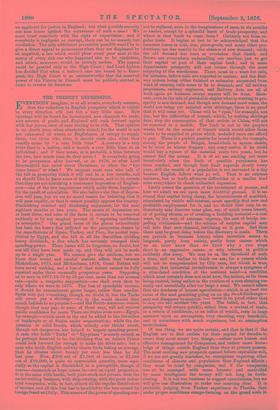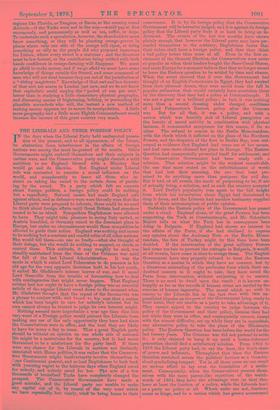THE PRESENT DEPRESSION.
EVERYBODY imagines, or at all events, everybody assumes, that the reduction in English prosperity which is visible in every direction will last but a very little time. New openings will be found for investment, new channels for trade, new sources of profit, and England will rush forward again with her joyous crew of men hasting to be rich. That opinion is no doubt true, when absolutely stated, for the world is not yet exhausted of wants, or Englishmen of energy to supply them, but those who state it should state also what they exactly mean by " a very little time." A century is a very little time to a nation, and a month a very little time to an individual ; and if they mean, as is probable, a time between the two, how much time do they mean ? Is everybody going to be prosperous after harvest, or in 1878, or after Lord Beaconsfield has cared about Christians, or when the " kye come hame," or when ? We suppose most men who talk of the lull in prosperity think it will end in a few months, and we should like to know some of their reasons, and to be certain that they are not mistaking a customary impression of English- men—one of the few impressions which make them happier— for the result of calculation. We also believe the time of depres- sion will pass, but we see no sound reason for believing that it will pass rapidly, or that it cannot possibly oppress the country, diminishing comfort and deadening enjoyment, for the next eighteen months or two years. The causes of depression are at least three, and none of the three is certain to be removed suddenly or by any magical process of "regaining confidence in enterprise." One grand cause of the gloom undoubtedly has been the heavy fine inflicted on the prosperous classes by the repudiations of Spain, Turkey, and Peru, the partial repu- diation by Egypt, and the fall in all the Securities yielding heavy dividends, a fine which has seriously cramped their spending-power. These losses will be forgotten, no doubt, but not till they have been made up, and they will not be made up in a single year. We cannot give the millions, but we know that sound and careful statists affirm that between Michaelmas, 1875, and Michaelmas, 1876, Great Britain will have saved nothing, and a loss of that extent cannot be fully repaired under three unusually prosperous years. Supposing us to save in 1877-78-79 by 33 per cent. more than our normal rate quite a sanguine supposition—we shall even then be only where we were in 1875. The loss of spendable income, it should be remembered, grows larger, rather than smaller. Spam may pay gernething, though we doubt it, but the Turks will never pay a shilling--,,ky in the world should they enrich Infidels to no purpose ?—and the South-amencan rebates, though they may pay, or some of them may, will not recover public confidence for years. There are States even now—Egypt, for example—which must in the end be added to the list either of bankrupts or of States under sequestration; while the de- pression in solid Stocks, which nobody ever thinks about, though not dangerous, has helped to impair spending-power. A man who holds " Turks " or " Egyptians " is nearly ruined, as he perhaps deserved to be, for thinking that an Asiatic Prince could look forward far enough to make his debts safe ; but a man who holds English railway shares finds, taking an average, that he obtains about twenty per cent, less than he did last year. Now, £200 out of £1,000 of income, or £2,000 out of £10,000, is quite an appreciable quantity, more espe- cially as the capital is diminished in a perceptible, though of course—inasmuch as hope comes in—not an equal proportion. It is the same with banks, both joint-stock and private, with the under-writing business, with ship-owning, with the great indus- trial eompanies, with, in fact, almost all the regular distributors of income, and all this loss has to be added to the loss caused by foreign fraud and folly. This source of the power of spending can- not be replaced, even in the imaginations of men, in six months or twelve, except by a splendid burst of trade prosperity, and where is that burst to come from ? Certainly not from re- gular trade. It begins at last to be acknowledged that the immense losses in coal, iron, piece-goods, and many other pro- ductions, are due mainly to the absence of new demand; while the old demand has been so overtaken that Smith and Brown are everywhere underselling one another, just to get their capital or part of their capital back ; and in some departments prosperity will not return through the mere emptying of the warehouses. There must be a want for rails, for instance, before rails are exported in masses; and the Rail- way system being either finished or extension suspended from want of returns, rails cease to be in demand, and till railway proprietors, railway engineers, and Railway Acts are all at work again no business except repairs will be done. More- over, even in the sale of perishable staples what is wanting to pro- sperity is new demand, and though new demand must come, the world not being yet satiated with shirtings, there is no proof that it will come yet. China will be " open," for example, one day, but the difficulties of transit, which, by making shirtings dear, stop the consumption of that article in China, will not be removed in a month. The limit is not in the people's wants, but in the means of transit which would allow those wants to be supplied at prices which secluded races can afford to pay. There is a perfect passion for broad-cloth, for example, among the people of Bengal, broad-cloth in square sheets, to be worn as winter drapery ; and every native if he could would buy a square of the material every two years, but he cannot find the money. It is of no use sending out more broad-cloth when the limit of possible purchasers has been reached, and though that limit expands slowly every year, still the wealth of a population is not increased in a day because English fullers want .to sell. That is an extreme instance, but as trade advances difficulties of a similar kind arise everywhere to check unlimited expansion.
Lastly comes the question of the investment of money, and here we admit we are upon more doubtful ground. It is as- sumed that capital being cheap, the inventiveness of mankind, stimulated by visible self-interest, must speedily find new and profitable employment for it, and no doubt that may be so. Somebody may discover some plan, say, of quick ocean transit, or of paving streets, or of creating a building material—a real want, by the way, of extreme urgency, the cost of bricks im- peding civilisation—and the volume of surplus capital may roll into that new channel, fertilising as it goes. But then there may be great delay before the discovery is made. There are periods in business history when invention seems to languish, partly from satiety, partly from causes which we no more know than we know why a race stops short in an aggressive career, or why interest in politics suddenly dies away. We may be on the threshold of such a time, and we incline to think we are, for a reason which will not be comprehended by City men, but which is true, namely, that industrial inventiveness is always a symptom of a stimulated condition of the national mind—a condition which most certainly does not exist now, the nation, so far from being excited, being rather in the position of a man sleeping un- easily and unrestfully after too large a meal. We cannot affirm that the deadness of honest speculation—which is at least one cause of the mad gambling going on on the Sio,:k Exchange— may not disappear to-morrow, there is no. proof either that lb may um 15,s1 anotner two years. The belief, in fact, that prosperity will return quickly, either from a revival of trade, or a return of confidence, or an influx of wealth, rests in large measure upon an assumption, very cheering, very beneficial, and in accordance with much experience, but an assumption nevertheless.
Of one thing we are quite certain, and that is that if the English are to find outlets for their capital for decades to come, they must secure two things,—rather more honest and effective management for Companies, and rather more know- ledge of things outside England than they at present possess. The most exciting new prospects opened before capitalists will, if we are not greatly mistaken, be enterprises requiring other conditions of climate and population than England affords ; they must be tried by companies, and if the companies can nt be managed with some honesty and controlled by some intelligence the money will not long be forth- coming. It is not our business to suggest speculations, but we will give one illustration to make our meaning clear. It is probable, judging from Yankee experience in Florida, that under proper conditions orange-farming on the grand scale in regions like Florida, or Tangiers, or Berea, or the country round Antioch—if the Turks were not in the way—would pay at first enormously, and permanently as well as tea, coffee, or hops. To undertake such a speculation, however, the shareholders must know something, or they will be planting orange-groves in places where only one side of the orange will ripen, or doing something as silly as the people did who proposed tramways for Lisbon, where every street is a staircase ; and the directors must be law-honest, or the contributors being robbed with both hands confidence in orange-farming will disappear. We must go afield to make money, and if we go afield we must have some knowledge of things outside the Strand, and some command of men who will not steal because they are out of the jurisdiction of a " sitting magistrate." Knowledge of that sort and law-honesty of that sort are scarce in London just now, and we do not know that capitalists could employ the "period of one per cent." better than in studying a little elementary physical geography, and discussing means of frightening, bribing, or persuading the plausible scoundrels who will, the instant a new method of making money appears, try to secure its manipulation. A little more geography and a little more Eighth Commandment would increase the income of this great country very much.



































 Previous page
Previous page